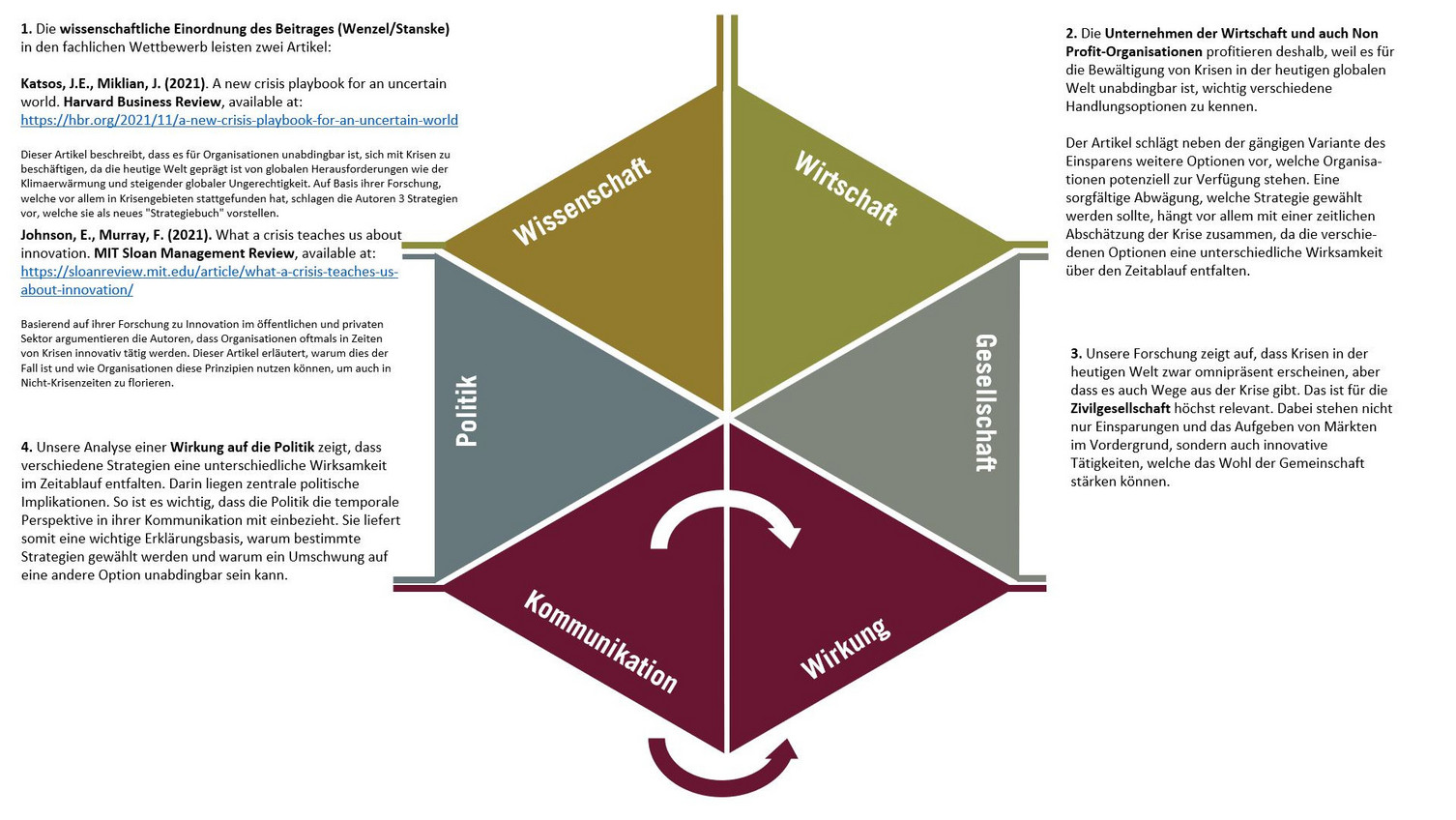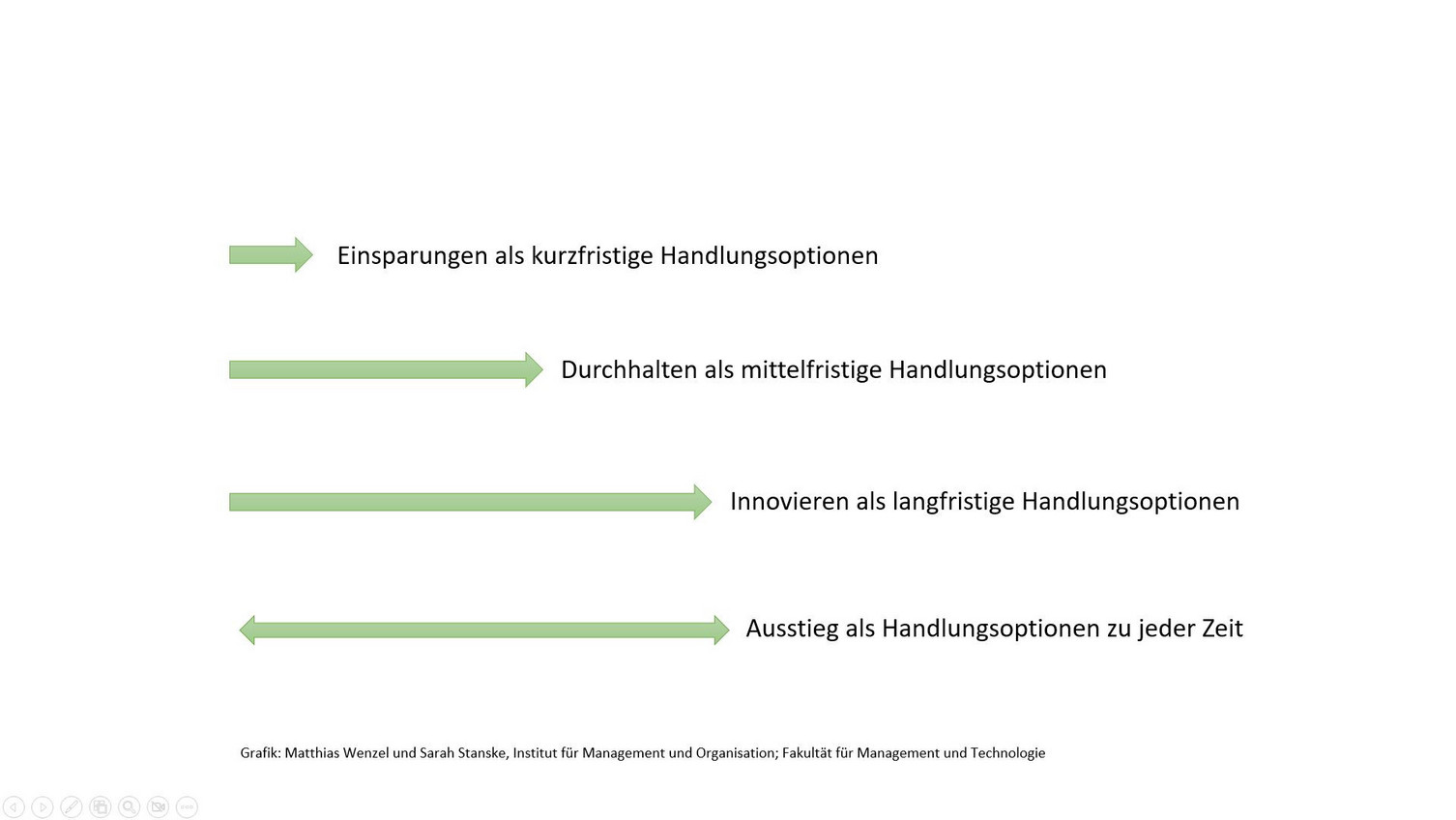Option "Hang on!" offers opportunities
Management of uncertainty
2023-03-09 Dealing with crises in companies and organisations - four lessons from current business research for practice. By Matthias Wenzel and Sarah Stanske
Strategic planning is a central duty for every organisation. Being able to adapt one's behaviour to the current situation is decisive for existential questions. This applies to the continued existence of companies as well as non-profit institutions.
Various scenarios are developed by the management level in dialogue with the operational units of the organisations. The aim is to be able to deal with an uncertain future in the best possible way. However, current crises such as the COVID-19 pandemic since 2020, the war in Ukraine since the beginning of 2022 and the resulting increase in energy prices show that even the most careful foresight and thinking in terms of alternatives has its limits. What is to be done from a business perspective in each individual case? Four options will be considered by comparing the findings of current research.
Crises are generally regarded as developments. They harbour potentially devastating and unpredictable effects on companies, industries and entire societies. In an increasingly agile, interconnected and globalised world, such events will occur even more frequently. It is therefore important to look at the possibilities of rapid action options. This can help find ways out of crises. In a paper published in 2020 in the Strategic Management Journal, we show four different strategies for companies to deal with crises as a contribution of research from Leuphana University Lüneburg. The results can also be applied to other organisations - for example those in the non-profit sector.
"In contrast to savings, perseverance describes sticking to the status quo. This strategy proved successful especially in confusing, rapidly changing situations when actors cannot yet estimate the duration and possible consequences."
Matthias Wenzel
Reduction - a possible strategy
Reductions are one of the most common measures in crisis mode. They include and describe the reduction of production and the general reduction of costs. This is possible, for example, by reducing staff or some divisions. During the pandemic, the Munich-based corporation Osram relied along this first variant on short-time work; board members and managers gave up parts of their salaries as well as bonuses. What at first glance looks like an acceptable solution to strategically adjust to the new framework conditions could, however, prove to be a fallacy in the long run: Among other things, synergies between activities can no longer be maintained or economies of scale can no longer be generated. Savings are thus considered an important short-term trading option. But the long-term consequences of austerity are often underestimated, which is why other strategies might fit better and come into focus.
Courage for the long haul
"Courage is good, perseverance is better", as Theodor Fontane already knew. In contrast to savings, perseverance describes holding on to the status quo. This second strategy option proved its advantage in the research, especially in confusing, rapidly changing situations. This applies when actors cannot yet estimate the duration and possible consequences. Instead of lapsing into actionism at an early stage, according to this behavioural option a company first observes the further development in order to then take other, suitable measures later. Especially in the early days of the pandemic, this was often the watchword in the German theatre scene. Thus, performances were held on to for the time being until the lockdown by the federal government was decided in mid-March 2021. Studies show that companies fare better with this strategy than organisations, which often try strategic innovations in order to quickly adapt to a confusing context. However, because the holdout strategy often involves high costs, this option is only suitable for a medium time horizon.
"Despite the most careful planning, not all crises can be predicted. Therefore, companies and non-profit organisations must learn to deal with these changing conditions. A practice of action that does this is becoming increasingly important in a globalised, increasingly agile world."
Sarah Stanske
With innovations out of the impasse
It is an often-cited assumption that crises not only bring challenges, but also offer opportunities. This is also confirmed by our research. Never has digitalisation and de-bureaucratisation in the country been driven forward faster than it was possible with the Covid pandemic. As a third option, we therefore observed innovating. This refers to taking other paths towards process or product innovation. Studies suggest that exploring alternatives is often done in times of crisis. And it is clear that it is precisely then that the social environment is more open to new ideas than it is in times of calm. Although innovating means leaving the beaten track, which initially also provokes uncertainty and can be resource-intensive, we argue as a result of the research that it is a valuable strategy for finding long-term solutions. Especially if the crisis lasts longer, the salvation cannot be sought in holding out and saving. The increasingly intense debate about green energy in Germany, for example, gained further momentum after voices became louder about dependence on Russian oil in the current Ukraine war. However, it is important for managers to find the right moment. Waiting too long can reduce the resources needed to innovate. If you act too quickly, the new idea may fail due to resistance.
Get out of the business
An exit, i.e. the complete abandonment of business activities in crisis-ridden environments, is also an important option for companies. One example is the German car manufacturer BMW, which is suspending both the construction and export of cars to Russia. Although this decision means current sales and profit losses, it is accepted. However, this is only the case if a different course of action or tactic would be perceived as illegitimate or would not have the desired effect. It should be emphasised, however, that it must not be an imposed decision; it must reflect a conscious strategic behaviour on the part of the leadership of an organisation, which can be the starting point for a strategic innovation. The newness is financed by the fact that "getting out of this business" also frees up financial and human resources that can be used elsewhere with future potential. However, this exit should not be seen as the very last exit option. For a company (and also a non-profit organisation), this fourth decision option can unfold the power to consciously create space for new territory at any time.
Conclusion for the practice
Despite careful planning, not all crises can be predicted. Therefore, companies and non-profit organisations must learn to deal with these changing conditions. A practice of action that does this is becoming increasingly important in a globalised, increasingly agile world. In order to find effective ways out of crises, we present four options for action which we have been able to derive from current research. One option is not better than the other per se. But in certain situations, one is more convincing than other alternatives. The first figure illustrates our argumentation and shows that a temporal component has to be taken into account. It provides guidance for practice.
If the crisis is expected to be short-lived, studies show ...
- ...that savings are a good way to contain the potential damage.
- However, in order to maintain synergy effects and to prevent premature actionism, holding out is preferable in the medium term,
- ...whereas in the long run, innovating is the best option.
- Exit, on the other hand, is an option open to actors at any time.
Although long-term strategic planning will continue to be important, it will also be necessary to consider options for action that were not previously planned for, as crises, although unpredictable, will become more important. Our options mentioned should thus be understood as an additional element rather than a mere substitution of traditional strategy elements.
The second figure describes the possible effects that this research contribution has in store for the four dimensions of practice.
 ©Matthias Wenzel/Sarah Stanske
©Matthias Wenzel/Sarah Stanske
Contact
Leuphana Universität Lüneburg
Institut für Management & Organisation
Fakultät Management und Technologie
Universitätsallee 1
21335 Lüneburg




